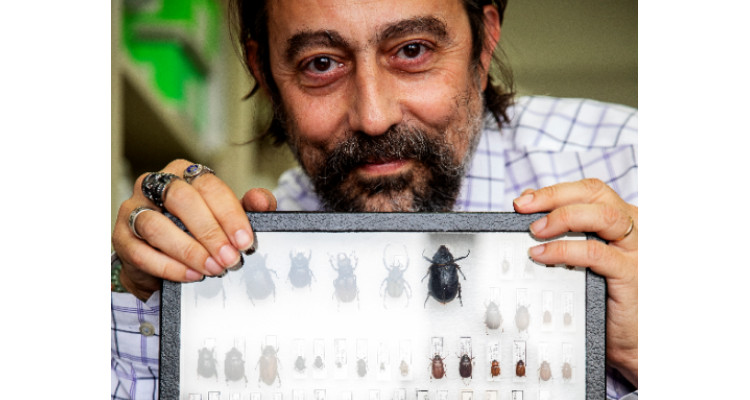
Adolfo: The Virus Hunter
Date Published: December 7, 2020
Adolfo Garcia-Sastre, PhD, reflects on the thrill of discovery and the connection between butterfly-catching, his hobby, and pursuing the universal flu vaccine.
Dr. Garcia-Sastre’s research has been focused on the molecular biology of influenza viruses and several other negative strand RNA viruses. Seasonal influenza is a major public health concern, triggering as many as 650,000 deaths every year globally, according to the World Health Organization. In addition, influenza pandemics, similar to the current COVID-19 outbreak, occur at irregular intervals and can claim millions of lives.

Dr. Garcia-Sastre with his insect collection.
Podcast Transcript
Dr. Garcia-Sastre: 00:00
This one came from Colombia. This one came from China. This one came from Burgos, my hometown in Spain. It relaxes me a lot to go from time to time. Go with my butterfly catcher, pick up a couple of beetles, a couple of butterflies, especially those that I don't know. "Oh! What beautiful colors, what beautiful shapes!" And then I mount them, classify them, and put them into boxes. My kids, for example, hate me because I kill butterflies. How can I kill butterflies, they are so beautiful and so nice? But I still find it quite relaxing.
Dr. Garcia-Sastre: 00:40
So what's easier to catch: these or a virus?
Dr. Garcia-Sastre: 00:43
Oh, a virus is more difficult to catch! These ones you see them and you pick them up. A virus you don't see, they are very sneaky.
My name is Adolfo Garcia-Sastre. I'm a professor of microbiology here at the Icahn School of Medicine at Mount Sinai. And I'm also Director of the Global Health and Emerging Pathogens Institute. Flu every year kills an average of 500,000 people worldwide. Here in the United States, an average of 35,000 people. So we have been working now on trying to generate an improved influenza virus vaccine that will prevent influenza virus infection, not only for influenza viruses that are circulating this year, but also for the influenza viruses that will be circulating 10 years from now, including potential new pandemic viruses.
When I was a young person, I didn't have at this time influenza in my mind, or medicine in my mind or making an impact on public health. Basically what I like is understanding how life works. I could have been happy working with a very strange ant in the Amazon that has a very strange shape and try to find out why they have this shape. But I actually like that I went into flu because I'm fulfilling my own desire to discover. And the fulfilling of these desires can be translated into something that is going to be of benefit to everybody.
This is a mad virus. So it's like a serial killer, meaning that influenza in general doesn't want to kill people. The influenza virus, the only thing it wants is to make copies of itself and propagate. But from time to time you get the mad virus which doesn't care so much about propagating and becomes more of an efficient killer. Basically what we want is to understand the mind of a criminal serial killer virus in order to be able to stop them.
Dr. Garcia-Sastre: 02:52
Would it be correct to call you the Sherlock Holmes of this effort?
Dr. Garcia-Sastre: 02:56
I love Sherlock Holmes. He was smarter than me!
When I'm very much immersed in my work, I start to become obsessed with a particular idea and it comes to my mind like a flash. These things happen to me when I'm running or when I'm in the shower or when I'm watching a movie or whatever, and then I become completely obsessed. You're thinking all the time in your mind, "Did I miss something?" And, "Is this something that is—a connection that I think could be important? Something important? And how to figure out whether this connection is important?" One of the best thrills was when we, for the first time, were able to recover influenza virus from plasmid DNA. This colleague of mine, he called me up at two o'clock in the morning to my home and said, "Adolfo, I have it." "Is it working?" "Yes, it is working." And that was a very thrilling thing. And this technology now is used everywhere to study influenza viruses. So it was a great discovery, and this compensates for all the work that is usually very tedious that we do when we are working in the lab.
When I will know that we have done it, that we have a universal vaccine—when we do the studies, the final studies, and it will take a long time still for that. Hopefully in my lifetime, but perhaps not, perhaps not. That's something that we can't know for sure. If it's a failure for whatever reason, I'm sure that we can learn from the failure and find out how to make it better. What do I do next after the universal flu vaccine? [laughs] I'm sure there will be another thing that will take my attention. What these things will be, I don't know. But I'm sure part of it will also be the thrill of discovery and finding new things.
